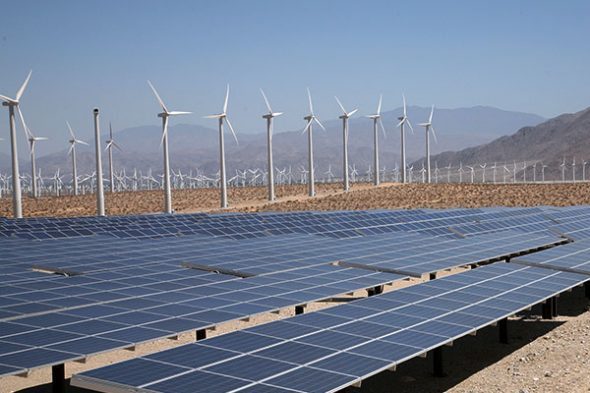
Saudi Arabia is inviting bidders to qualify for its first renewable energy tender by 20 March. The world’s top crude exporter is laying the groundwork for a rollout of wind and solar power, which will allow it to reduce the amount of oil used domestically and, it hopes, will stimulate economic development in clean energy.
The selected parties will be announced by 10 April and will be able to present their offers for the projects from 17 April to the end of July, according to a statement by the energy ministry. As much as 700MW of wind and solar power will be available in this tender – the first stage of Saudi Arabia’s plan to develop almost 10GW of renewable energy by 2023.
Auctions were also trending in the news in India, after a World Bank-backed auction on 10 February produced a record low bid of 3.30 rupees (5 US cents) a kilowatt-hour for solar PV. The auction for 750MW of power in Madhya Pradesh state included payment guarantees, annual tariff increases and power purchase agreements designed by the International Finance Corporation. All of which helped boost confidence in the projects for developers.
The lower electricity tariffs produced by India’s auction will be attractive to the country’s indebted state-run power retailers, and could help them improve their finances, according to BNEF.
The trend for allocating renewable energy capacity through competitive auctions may spur developers to scale up the size of projects in key European markets, according to state lender Norddeutsche Landesbank Girozentrale. In an effort to meet the low tariffs demanded of auction winners, developers and financiers may seek to save on maintenance and grid-connection costs by building bigger wind parks, according to a NordLB spokesman.
These tactics may be in evidence in Germany’s auctions for 2.8GW of onshore wind capacity this year, and France’s plans to put 3GW of capacity under the hammer by 2019.
In other wind industry news, Siemens announced that it would close a wind turbine factory in Denmark last week, eliminating 430 jobs in the process. The factory in Engesvang produces smaller turbine blades and hasn’t been able to meet the growing demand for larger blades, including those needed for offshore wind farms.
Canadian utility Enbridge is joining up with Germany’s Energie Baden-Wuerttemberg on a EUR 1.8bn ($1.9bn) wind farm under construction in the German North Sea, according to a statement last Friday. EnBW is selling a 49.9% stake in the 497MW Hohe See wind farm to the Calgary-based firm, and the two companies will work on the project together. It is expected to start operations in August 2019.
In other news, climate change could trigger resource and border conflicts and in the worst cases precipitate war, according to top European and United Nations officials who spoke about the military threat of global warming at a world security conference in Munich last weekend.
“Climate change is a threat multiplier that leads to social upheaval and possibly even armed conflict,” the UN’s top climate official, Patricia Espinosa Cantellano, said at the conference. Climate change and population growth were named as the two most serious “megatrends” threatening international peace and stability by Secretary General Antonio Guterres.
The delicate balance between protecting the Arctic and extracting fossil fuels was discussed at the event, as was the economic threat posed by European renewable energy to Russia’s oil and gas supply.
The question of whether President Donald Trump pulls the US out of the Paris climate accord was also discussed. “The response of the international community will be significant,” in the ultimate decision of whether or not the agreement is abandoned by the US, said US Democratic Senator Sheldon Whitehouse.
If no action is taken to tackle global warming, as much as 70% of Alpine snow could disappear by the end of the century, according to new research by the European Geosciences Union. The paper, which used three-dimensional modelling to understand the effects of global warming on mountain snow coverage, said that the Alps would lose about 30% of snow cover by 2100 even if countries limit temperature increases to below 2 degrees Celsius. So it might be time to grab your skis and hit the slopes while you still can.
Source: BNEF. Reproduced with permission.






